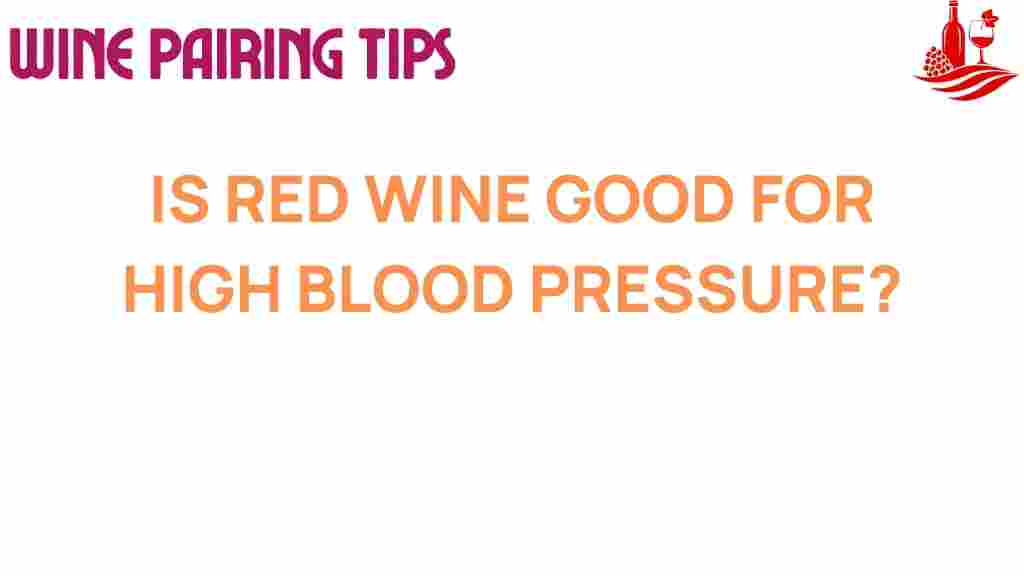Uncorking the Truth: Is Red Wine Beneficial for High Blood Pressure?
High blood pressure, or hypertension, is a common health issue affecting millions worldwide. As people search for effective ways to manage their blood pressure, many wonder about the health benefits of red wine. This article delves into whether red wine can be beneficial for high blood pressure, exploring its antioxidant properties, cardiovascular effects, and the importance of moderation in wine consumption.
Understanding High Blood Pressure
Before we explore the relationship between red wine and high blood pressure, it’s essential to understand what hypertension is. High blood pressure occurs when the force of blood against the artery walls is consistently too high. This condition can lead to severe health issues, including heart disease, stroke, and kidney problems.
Factors contributing to high blood pressure include:
- Genetics
- Unhealthy diet
- Lack of physical activity
- Excessive alcohol consumption
- Stress
The Role of Diet in Managing Blood Pressure
Diet plays a crucial role in managing high blood pressure. A balanced diet rich in fruits, vegetables, whole grains, and lean proteins can help regulate blood pressure levels. Additionally, certain foods and beverages, such as red wine, are often discussed regarding their potential health benefits.
Exploring the Health Benefits of Red Wine
Red wine has been the subject of extensive research, particularly its potential health benefits due to its high concentration of antioxidants. One of the primary antioxidants in red wine is resveratrol, which has been linked to numerous health benefits.
Antioxidants and Cardiovascular Health
Antioxidants are compounds that help combat oxidative stress in the body, which can lead to chronic diseases, including cardiovascular issues. The consumption of red wine is associated with several potential cardiovascular benefits:
- Improved Heart Health: Moderate red wine consumption has been linked to a reduced risk of heart disease.
- Lowered LDL Cholesterol: Red wine may help lower bad cholesterol levels (LDL) while increasing good cholesterol (HDL).
- Enhanced Blood Vessel Function: The compounds in red wine can help improve the function of the endothelium, the thin layer of cells lining blood vessels.
Red Wine and High Blood Pressure: What Does the Research Say?
Several studies suggest a relationship between moderate red wine consumption and lower blood pressure. For instance, a study published in the American Journal of Hypertension indicated that moderate red wine consumption could lead to a slight reduction in blood pressure. However, it’s crucial to define what “moderate” means.
Defining Moderate Wine Consumption
Moderate consumption of red wine is generally defined as:
- One glass per day for women
- Up to two glasses per day for men
Exceeding these amounts can lead to adverse health effects, including increased blood pressure, liver damage, and addiction.
How to Incorporate Red Wine into a Healthy Lifestyle
If you are considering adding red wine to your lifestyle to manage high blood pressure, here are some tips:
- Choose Quality Over Quantity: Opt for high-quality red wines that are low in sugar and additives.
- Pair with Healthy Foods: Enjoy red wine with a meal rich in fruits, vegetables, and whole grains.
- Stay Active: Combine wine consumption with a regular exercise routine to maximize cardiovascular benefits.
- Monitor Your Health: Regularly check your blood pressure and consult with your healthcare provider about your dietary choices.
Potential Risks of Red Wine Consumption
While moderate consumption may have benefits, it’s essential to consider the risks involved:
- Alcohol Dependency: Regular consumption can lead to dependency issues.
- Interactions with Medications: Alcohol can interact with various medications, including those prescribed for high blood pressure.
- Increased Blood Pressure with Excess: Overconsumption of alcohol can lead to elevated blood pressure levels.
Troubleshooting: What to Do If You Experience Issues
If you notice any negative effects from consuming red wine, consider the following troubleshooting tips:
- Reduce Intake: If you experience headaches or discomfort, cut back on your wine consumption.
- Consult a Professional: Speak with a healthcare provider about your wine consumption and blood pressure management strategies.
- Consider Alternatives: If red wine is not suitable for you, explore other dietary choices that may help manage blood pressure, such as herbal teas or non-alcoholic red wines.
Conclusion: The Bottom Line on Red Wine and High Blood Pressure
In conclusion, moderate red wine consumption may offer health benefits, particularly regarding cardiovascular health and potentially lowering high blood pressure. However, the key to enjoying these benefits lies in moderation and the overall context of a healthy lifestyle. It is crucial to make informed dietary choices, remain physically active, and consult with healthcare professionals about any concerns regarding high blood pressure.
As with any dietary consideration, balance is vital. If you’re looking to incorporate red wine into your routine, do so thoughtfully and in conjunction with other healthy lifestyle practices. For more information on dietary choices for managing high blood pressure, consider checking this guide from the American Heart Association.
This article is in the category Tips and created by Wine Pairing Tips Team
